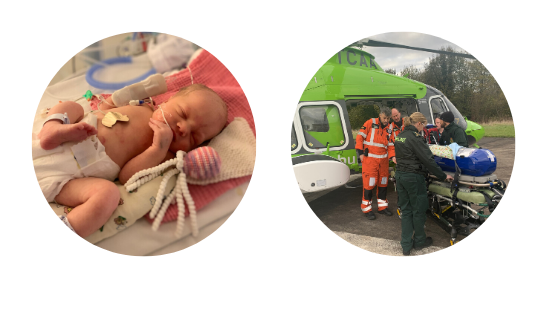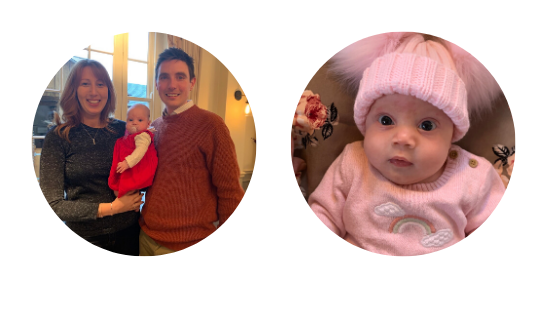News Hub
Children’s Air Ambulance flies baby Harriet home

After the unexpected birth of their first child by emergency C-section five weeks early, Malika and Chris Smith say they were “very traumatised” and far from their family support network.
Baby Harriet was born after Malika started haemorrhaging while away on a weekend spa break with Chris. The couple were enjoying some time together after being separated during most of the pregnancy due to both their work commitments in the RAF.
Malika had suffered a placental abruption*, which puts mother and baby at risk if left untreated, and was blue-lighted by land ambulance to Cumberland Infirmary, Carlisle.
Within two hours of arriving, Harriet was born and immediately taken to the Special Care Baby Unit and put on a CPAP machine to help her breathing. She was severely jaundiced – which required phototherapy treatment – and had a heart murmur.
Chris was going back and forth between the Special Care Baby Unit and maternity ward, where Malika was recovering from the emergency C Section and losing 2.5 litres of blood. It wasn’t until 13 hours later that mother and baby were reunited.
“Chris and I are both used to coping with varying levels of stress, but we found ourselves thrown into a special care environment miles away from home and we felt incredibly scared, lonely and isolated,” says Malika
After four days Harriet was well enough to be transported to a Special Care Baby Unit at Harrogate District Hospital – 112 miles away – which was closer to their home in Northallerton. Chris and Malika were immediately put at ease when the Children’s Air Ambulance and a specialist neo-natal team from Embrace – Yorkshire & Humber Infant & Children’s Transport Service – arrived at Cumberland Infirmary to transfer their daughter.
Chris and Malika were immediately put at ease when the Children’s Air Ambulance and a specialist neo-natal team from Embrace – Yorkshire & Humber Infant & Children’s Transport Service – arrived at Cumberland Infirmary to transfer their daughter.
The helicopter took off from its Oxford base and flew to Barnsley to pick up the Embrace team and then on to Carlisle to meet the couple and Baby Harriet.
Harriet was prepared for the flight back to Harrogate by the Embrace team who then accompanied her on the 45-minute journey between hospitals
“We knew immediately that Harriet was in safe hands. Everyone was fantastic and incredibly supportive during such a distressing period of our lives. The pilots and Embrace team working together were so efficient and professional. They made it OK for us to give our four-day-old daughter to people we didn’t know. We instantly trusted them and couldn’t fault anything they did for our baby girl.”
“It was the hardest thing to stand watching the helicopter take off and not be able to be with her but we knew she was in safe hands,” says Malika.
Although there is a parent seat on the helicopter, Malika was unable to fly due to the amount of blood she had lost during the operation so Chris drove them the four and half hours straight to Harrogate hospital to reunite them as a new family.
Harriet spent another eight days in the local Special Care Baby Unit – where she received further phototherapy treatment and feeding support through a feeding tube in her nose – before she was well enough to go home. She is now a much loved happy, bubbly 14 weeks old who has fully settled in at home, surrounded by her family.
“Normal ambulances just aren’t equipped to cater for babies and young children in the same way as the Children’s Air Ambulance. We didn’t know it existed but now, having had first-hand experience of what it does, we fully appreciate what a difference it makes to peoples’ lives. We were lucky that it was available to transfer our daughter and will always be grateful to the team for what they did for our baby girl,” says Malika. The public’s support is vital for missions like Harriet’s, especially during these unprecedented times, to find out more on ways you can support the Children’s Air Ambulance, click here
The public’s support is vital for missions like Harriet’s, especially during these unprecedented times, to find out more on ways you can support the Children’s Air Ambulance, click here
*Placental abruption (abruptio placentae) is an uncommon yet serious complication of pregnancy. The placenta develops in the uterus during pregnancy. It attaches to the wall of the uterus and supplies the baby with nutrients and oxygen. Placental abruption occurs when the placenta partly or completely separates from the inner wall of the uterus before delivery. This can decrease or block the baby’s supply of oxygen and nutrients and cause heavy bleeding in the mother. Placental abruption often happens suddenly. Left untreated, it endangers both the mother and the baby.
